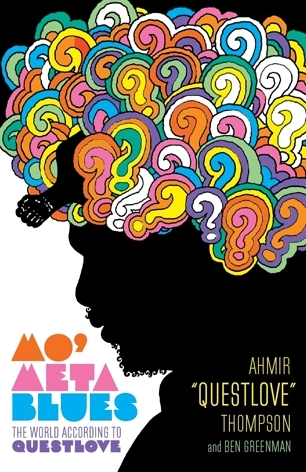
By Ahmir “Questlove” Thompson and Ben Greenman
(Central Publishing)
Countless rappers and NBA stars have adopted a self-consciously nerdy fashion acumen, everything from Izod shirts to conspicuous eyeglasses.
Then there’s the real deal, Ahmir “Questlove“ Thompson: driving force behind the Roots, Twitter giant, compulsive compiler of music lists and now author, with Ben Greenman, of the new quasi-memoir “Mo’ Meta Blues.”
The guy who emerges from these pages is an outcast, music-obsessed kid who gradually became a wise head of hip-hop, a voice of moral authority and wary good humor in a field known for hard posturing and self-indulgence. “I knew straight off the bat that I wasn’t like other kids,” he writes early on. So it stands to figure that “Mo’ Meta Blues” isn’t like many other pop music memoirs.
For starters, there’s the structure. Greenman, an editor at The New Yorker, gets a series of his own riffs in memo form (“From: Ben Greenman (cowriter). To: Ben Greenman (Editor)”). Longtime Roots co-manager Richard Nichols handles the long (and frequently very funny) footnotes, often disagreeing or gently chiding the author.
That’s one way to be meta. But the title’s play on words has a more specific meaning. The Roots’ seminal 1999 album, “Things Fall Apart,“ begins with a contentious bit of dialogue from Spike Lee’s jazz drama “Mo’ Better Blues.” Denzel Washington’s trumpet player decries black audiences’ failure to support black music. Wesley Snipes’ saxophonist retorts: Play something with mass appeal, and the masses will respond.
This tension between art and commerce plays out through the Roots’ ever-evolving career and through the pages of the book. As Questlove writes of the “Mo’ Better” debate, “It’s a dialectic in the classic sense: a way of setting an idea against its negation in the hope of finding a ray of light.”
Where much of America knows the Roots as the house band on “Late Night With Jimmy Fallon,” that gig is just the latest and most unlikely step for the group largely responsible for launching what became the neo-soul movement. From their inception in Philadelphia, they stood apart merely by playing their own instruments, with Questlove leading the charge from behind his meticulously tuned drum kit. The Roots had to prove their bona fides in a hip-hop culture often suspicious of what comes from outside the box. The fact that they named the recently platinum-certified “Things Fall Apart” for a Chinua Achebe novel suggests they’re not your average outfit.
“Mo’ Meta Blues“ is at its best exploring friction within hip-hop and black culture in general. “When was hip-hop’s funeral?” Questlove asks, before returning to the 1995 Source Awards, rife with cultural and geographic conflicts. A bit later he laments the charge, leveled by ”middle-class black writers,“ that the Roots aren’t black enough:
“Black people who are the only black people at their jobs will feel a need to overcompensate and show their blackness explicitly.”
It’s worth noting that Questlove doesn’t exempt himself from this phenomenon, but I’d be curious to know how he thinks it applies to the Fallon job. It’s culturally significant to see a hip-hop group, led by a cerebral drummer with a giant Afro, playing the Doc Severinsen part on a network talk show. He gets into the gig a little at the end of the book, but never with the critical insight on display in previous pages.
Then again, how many pop memoirs can lay claim to cultural criticism at all? That kind of feat requires a proud nerd. Questlove is just the man for the job.
(MCT)
-
Articles by Korea Herald





![[K-pop’s dilemma] Can K-pop break free from ‘fandom’ model?](http://res.heraldm.com/phpwas/restmb_idxmake.php?idx=644&simg=/content/image/2024/05/09/20240509050541_0.jpg&u=20240509173751)




![[News Analysis] Yoon's first 2 years marked by intense confrontations, lack of leadership](http://res.heraldm.com/phpwas/restmb_idxmake.php?idx=644&simg=/content/image/2024/05/09/20240509050612_0.jpg&u=20240509233252)








![[Today’s K-pop] NCT’s Mark to drop 1st solo album in February 2025](http://res.heraldm.com/phpwas/restmb_idxmake.php?idx=642&simg=/content/image/2024/05/10/20240510050597_0.jpg&u=)